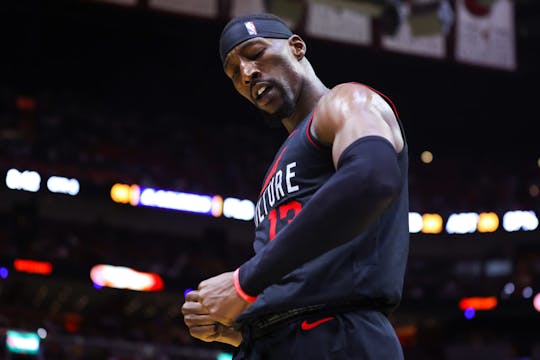If there’s such a thing as the Kia Defensive Player of the Year-in-waiting, Miami Heat big man Bam Adebayo would be that guy.
He is the defensive signal caller on one of the league’s grittiest teams, riding that style to the NBA Finals in 2020 and 2023. Four times Adebayo, 26, has been named to NBA All-Defense teams, and the 6-foot-9 forward/center has finished in the Top 5 in DPOY balloting in each of the past four seasons.
Heat coach Erik Spoelstra has sanctioned the award as one worth chasing because of the good things that happen for the winner’s team. So Adebayo has been honest in his pursuit of it.
In the first in a series of interviews with candidates for this season’s DPOY, Adebayo spoke with NBA.com Wednesday about his role as Miami’s defensive leader and what’s required to thrive on that side of the ball. This Q&A is edited from that longer conversation:
NBA.com: How do you think this season has gone, particularly since you’ve been back from your hip injury?
Bam Adebayo: Aw man, I feel like as a team, we learned a lot of lessons this fall. We’ve had guys in and out of the lineups. We’ve had big leads and still lost games. We’ve been in close games and won. Individually, we’ve all grown from those lessons. Everybody has taken a step to improve by 1% in whatever that may be. That may be dealing with a back cut. It may be increasing your free throw percentage. Or anything. I feel like everyone has done something to get 1% better.
That’s big, then, if you add up all those 1% improvements.
One hundred percent. [laughs] We’re in that culture for that.
Losing players to injuries, people typically talk about where the points or the assists will come from. But what does it do to a defense to have guys missing, new faces plugged into it, others now trying to get on the proverbial “string” to which all five men are supposed to stay tied?
When guys are out, the biggest thing a defense will miss is talking. Every defense will have one or two people who are the most vocal. They are the heat that makes the engine run. As soon as a guy goes out, who has to step up and continue talking? That’s the problem I feel a lot of defenses run into because then you’re not on the same page. … When one of those guys goes down, everybody has to be more vocal.
How and when did you learn to value defense? Was it in high school in North Carolina? In your year at Kentucky? Or has this been a Miami thing for you?
Nah, defense has always been a part of me. That’s definitely how I got on the court in Miami. But I feel it comes from having that workhorse mentality. Being available and continuing to give the effort. That’s defense — effort, effort, effort. Like Spo says in the media sometimes, “multiple efforts.” It’s being willing to “burn that extra calorie and get there.” That’s what we say in practice.
Every rep matters. Being a technician on defense. Being in the right spot. Talking. Watching film, learning guys’ tendencies. It matters. When you get to the playoffs, you understand that the game slows up and goes possession by possession.
It’s a common transition in this league for offensive-minded players to be nudged or pushed to improve defensively. You have gone in the other direction, a defender whose offense has been growing. Your shots and scoring average have gone up every season for seven years. That sounds like fun, but how have you made sure your defense hasn’t slipped?
Every time you’re on defense doesn’t mean you’re going to be in closeouts. It doesn’t mean your guy is going to get the ball and you have to play 1-on-1. There will be some games where I’ll be guarding the No. 1 or No. 2 option, but other nights I’ll be there vocally. Letting ‘em know where the screen is coming. “Watch the back door!” Then when we get the rebound, that’s my time to be aggressive. I’ve done my time vocally, now it’s time to catch it and go.
But some nights it might be, “Bam, you have to drive us on offense and defense.”
That sounds like a long night.
Yeah. Then I’ll do what I need to do after the game. Ice bath. Recovery. You figure it out after that.
What’s your view of the different types of defenders in this league: On-ball, rim protectors and those few like yourself who can guard multiple positions?
That’s what makes us special in this league. There’s only 450 of us, and now you’re talking about one or two guys per team. There’s only 30 teams. Then there’s how guys fit on their teams. Some coaches know how to maximize a guy’s potential. … Me and my coach are on the same page.
Do you have to fight uphill for DPOY consideration because of the stats that get the attention? On-ball defenders get noticed for how many points below his average they might “hold” their man. Rim protectors get lauded for blocked shots and opponents’ field goal percentages. But when you’re moving and switching and helping, inside and out, does that blur your case?
Uh … no. [laughs] People just have to see you. It’s always around playoff time that you’ll hear, “This is why he was in the running …” But in the regular season a lot of times, we’re not one of the highly talked-about teams. A lot of this game is about entertainment and there are guys who are very special on the offensive end. So I feel we just don’t get watched enough.
Some people think, “We don’t want to watch team basketball and everybody’s getting 20 points. We want to watch two of you get 70.” I get it because I did it. I grew up as a Kobe Bryant fan. I wanted to be like Kobe. It starts to register when you get older, nah, he was special. But growing up, you know everybody was throwin’ stuff in the trash can yelling, “Kobe!”
You’ve made it to the Finals twice. The first one in 2020 might not have happened if not for your signature defensive moment: the block of Boston’s Jayson Tatum at the end of Game 1 of the East finals in the Orlando “bubble.” You called that play an “out-of-body experience.” What sort of shelf life has that had for you?
It’s funny now because me and Jayson are so cool. We grew up together, we’ve seen each other go through college and flourish in this league. So it’s a fun moment. Out of all the people it could have been — we’ve been in camps together, we’ve been in pro league games, showcase games, all the way from kids to that point. So I always tell him it’s an anniversary and text him, “You know what day it is?”
In last season’s Finals, your team had a special challenge. Denver coach Michael Malone told me recently that, as good as you are as a defender, the Nuggets didn’t strategize anything for coping with you because their center, Nikola Jokic, is such a unique player. Malone feels it’s on the opposing big men to cope with him. What was that like, facing Jokic game after game?
Well, he’s going to say that, that’s his guy. I expect that. But for me, it was the first time I had to really scout a guy for being a passer and a scorer. You’re worrying about cuts, you’re worrying about “they do this very well,” and sometimes you have to choose. Defense is not easy. You’re trying to stop people who work on their games every day from getting to their comfort zones.
The way their offense is, though, it isn’t just him. He generates a lot for them, but they’ve got guys over there who can hoop.
The league has a new rule this year, requiring candidates to play at least 65 games to be eligible for most major awards and honors. You missed 10 of the Heat’s first 30 games. What do you think of the new minimum and does it alter your approach to the remaining games?
It doesn’t, just because I love playing basketball. Bruised, banged up, indifferent, I love being out there with my teammates. So that rule [to discourage “load management” nights off] didn’t really apply to me. The fact that we have a rule about it sounds crazy to me.
With your cushion down to seven games now, legitimate injuries or illnesses, even minor ones, could spoil your chances at the DPOY or All-Defense.
What if the top three guys for MVP voting get enough injuries during the year where you can’t vote for them because they all missed 20 games?
That Udonis Haslem endorsed you as a candidate who’s overdue, that Spoelstra sanctioned the DPOY as an award worth chasing, does that give you the green light to have that as a goal?
One hundred percent. It’s never me out there trying to guard five people. It’s me quarterbacking it, but it’s about all my teammates listening to me. In the huddle. On the court when I tell them what’s about to happen. And then they talk to me. It’s not just a “me” award. It’s for all of us. It means we have a Top 3 defense. It means we’ve committed to doing the tough things.
Actually, right now the Heat rank 13th (113.8) in defensive efficiency and 19th (48%) in opponents’ field goal percentage. Are those stats that matter? If so, how do you improve them? If not, how do you get award voters to look past them?
That’s not good enough. We want Top 5, we always preach Top 5. The only way you can get to that is game by game, film session by film session. We can kind of figure out our offense — it might not be the best but we can figure it out. Defense? If everybody is not on the same page, people will get wide-open layups and 3s the whole game.
Having guys going in and out [with injuries], now we’ve got [other] guys who usually get in for five minutes getting in for 15 or 20. So we’re going step by step, catching them up as fast as possible. To the point where, by the time we get to the end of the year, everybody is 100% confident on that side of the ball. You know exactly what “this” scheme is because we do it Every. Single. Day.
* * *
Steve Aschburner has written about the NBA since 1980. You can e-mail him here, find his archive here and follow him on Twitter.
The views on this page do not necessarily reflect the views of the NBA, its clubs or Warner Bros. Discovery.




